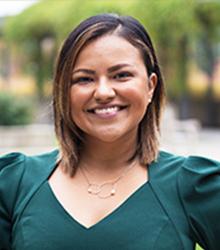
Geovanna Rodriguez
Biography
Geovanna Rodriguez, Ph.D. is an Assistant Professor of School Psychology in the Special Education and Clinical Sciences Department. Prior to joining the faculty at the University of Oregon, Dr. Rodriguez earned her Ph.D. at the University of California, Riverside, during which she completed an APA accredited internship providing school-based mental health services in Illinois. After completing her degree, she worked as an NIH funded T32 postdoctoral research trainee at the Waisman Center, with a special focus on research in Intellectual and Developmental Disabilities. She currently serves as the Early Career Psychologist (ECP) representative for Division 33 (IDD/ASD) of the American Psychological Association.
Dr. Rodriguez’s education and training is in school psychology, with an emphasis on understanding the development and maintenance of mental health problems in children and adolescents with autism spectrum disorder (ASD) and other types of neurodevelopmental disabilities. She is bilingual in Spanish and has professional experiences working with children and families in both school and community settings.
Education
Postdoctoral Research Fellow, 2019, Postdoctoral Training Program in Intellectual and Developmental Disabilities Research
Waisman Center, University of Wisconsin-Madison
Program Director/Advisor: Sigan Hartley
Ph.D., 2017, University of California, Riverside
Major: School Psychology
Co-Advisors: Jan Blacher & Cathleen Geraghty
Predoctoral Internship, 2016-2017, Deerfield High School (Township District 113)
Illinois School Psychology Consortium (ISPIC)
Director of APA-accredited program: Brenda Huber
M.A., 2015, University of California, Riverside
Major: Education (School Psychology)
B.A., 2009, University of California, Los Angeles
Major: Psychology
Minor: Latin American Studies
Honors and Awards
2018 Theodore Tjossem Postdoctoral Travel Award, Gatlinburg Conference
2016-2017 Graduate Research Mentorship Award, UC Riverside
2015 Dean’s Fellowship, Graduate School of Education, UC Riverside
Publications
Rodriguez, G., Hartley, S., & Bolt, D. (2019). Transactional relations between parenting stress and child autism symptoms and behavior problems. Journal of Autism and Developmental Disorders, 49(1), 1-12.
Goetz, G. L., Rodriguez, G., Hartley, S. L. (2019). Actor-partner examination of daily parenting stress and couple interactions in the context of child autism. Journal of Family Psychology: JFP: Journal of the Division of Family Psychology of the American Psychological Association (Division 43). doi: 10.1037/fam0000527.
Hartley, S. L., Hickey, E. J., DaWalt, L. S., & Rodriguez, G. (2019). Broader autism phenotype and couple interactions in parents of children with autism. Autism: International Journal of Research and Practice. doi: 10.1177/1362361319841312.
Tipton, L. A., Rodriguez, G., Zeedyk, S. M., & Blacher, J. (2018). Stability of bullying and internalizing problems among adolescents with ASD, ID, or typical development. Research in Developmental Disabilities, 80, 131-141.
Zeedyk, S.M., Rodriguez, G., Tipton, L.A., Baker, B., & Blacher, J. (2014). Bullying of youth with ASD, intellectual disability and typical development: Victim and parent perspectives. Research in Autism Spectrum Disorders, 8, 1173-1183.
Research
Dr. Rodriguez’s program of research has focused on identifying system-level factors within environmental contexts (e.g., home and school) that may increase the risk of mental health problems in at-risk samples, including children and adolescents with autism spectrum disorder and marginalized children and families from underrepresented backgrounds. She has utilized longitudinal research designs to examine familial processes (e.g., stress, marital relationships, parenting), as well as specific school experiences (e.g., bullying victimization), that may contribute to mental health problems in youth with disabilities, specifically during the transition from childhood to adolescence. She is interested in expanding this work to improve the accessibility and delivery of school-based mental health services and supports for youth with disabilities, with the aim of developing targeted approaches to evidence-based interventions for underserved populations. Additional interests include family-school partnerships, teacher training and education, child risk factors and school predictors of bullying victimization, and mental health services and supports for Latinx children and families.
